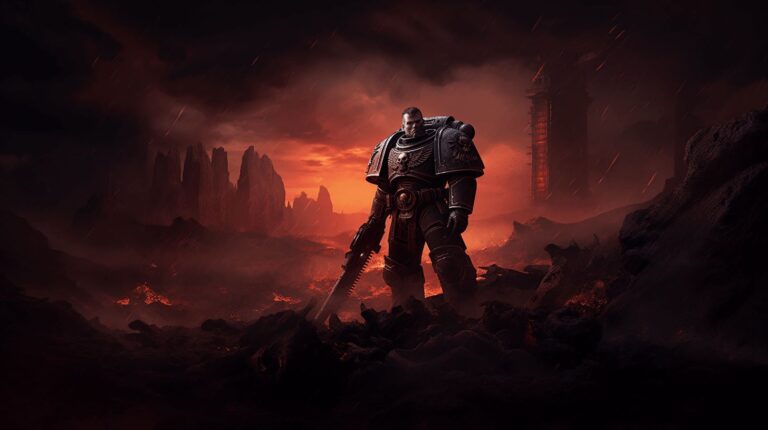Where most franchises construct their worlds piece by piece, Warhammer 40,000 presents a galaxy fully formed, teeming with stories waiting to be told. From the towering hive cities of Necromunda to the ethereal realms of the Eldar, every corner is a potential epic waiting to captivate audiences.
And as we’ve seen, audiences crave depth; they desire worlds they can lose themselves in, characters they can rally behind or vehemently oppose. With its blend of endless lore and breathtaking battles, Warhammer 40,000 isn’t just poised to enter the cinematic stage—it’s destined to conquer it.
Here are my 8 big reasons why I think we’re about to witness the rise of a new cinematic empire:
- The Warhammer 40,000’s lore is a cinematic goldmine waiting to be unearthed
- It has a loyal and ever growing fan base
- It’s the perfect fit for the age of dark and gritty sci-fi
- It offers the ideal canvas for epic battles and visual spectacle
- Its huge pool of interesting characters provide a tapestry of complexity and intrigue
- It provides an almost infinite resource for spin-offs and expanded universes
- Its an uncharted territory of unique storytelling
- W40K offers a treasure trove of cinematic revenue potential
Continue reading below!
The Warhammer 40,000’s lore is a cinematic goldmine waiting to be unearthed
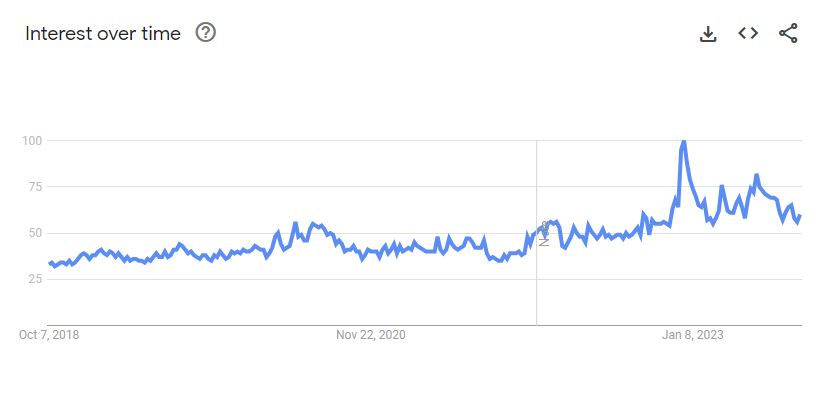
Cinema is fueled by stories, and when it comes to intricate narratives and grand epics, few universes can compare to that of Warhammer 40,000. Delving deep into this rich tapestry, it becomes evident that the lore alone offers boundless opportunities for filmmakers. Let’s explore some of these narratives and understand their cinematic potential.
A universe born from millennia of history
From its very foundation, Warhammer 40,000 sets the stage with its mantra: “In the grim darkness of the far future, there is only war.” The timeline is immense, encompassing tens of thousands of years. Such expansive timeframes have given birth to eras like:
- The Dark Age of Technology: A time of great human advancement, ultimately leading to their downfall. This era is a testament to the timeless allure of stories about hubris and the perils of unchecked ambition.
- The Horus Heresy: A civil war on an intergalactic scale, it’s a tale of brotherhood, betrayal, and unimaginable conflict. Imagine a tale that combines the political intrigue of Game of Thrones with the galactic combat of Star Wars.
Diverse alien races with their own tales
In Warhammer 40,000, humanity isn’t alone. The universe teems with diverse species, each with their distinct cultures, histories, and tragedies:
- The Eldar: An ancient, psychic race whose own hedonism led to their decline and the birth of a new chaos god. Their stories, like The Fall of the Eldar, could be likened to mythic tragedies, full of lessons, loss, and the hope of redemption.
- The Tyranids: An extragalactic swarm, consuming all in their path. Their hive-minded nature and unstoppable tide offer a unique take on the alien invasion trope, pushing the boundaries of horror and existential dread.
Characters that are epics unto themselves
Beyond events and races, the characters of Warhammer 40,000 are epics personified:
- Primarchs: Demigod-like beings, each a facet of the Emperor’s own vast psyche. Take Lorgar’s descent into heresy or Angron’s tragic wrath; each character offers layers of complexity and emotion, rivaling iconic figures like Achilles or Odysseus.
- Ciaphas Cain: A commissar with a reputation for heroism, yet driven by self-preservation. His stories mix dark humor with genuine insight into the human condition, perfect for a character-driven saga.
Potential for deep themes and philosophical exploration
At its core, Warhammer 40,000 isn’t just battles and politics. It grapples with questions of faith, the nature of humanity, and the fine line between order and tyranny. The Eisenhorn series, for instance, delves deep into the gray morality of the Inquisition, challenging viewers to reflect on ends versus means.
The lore of Warhammer 40,000 isn’t just a backdrop; it’s a pulsating, living entity of narratives. For filmmakers, it’s not just about adapting a story but uncovering a universe.
With its depth, diversity, and thematic richness, the world of Warhammer 40,000 stands ready for its cinematic renaissance. It beckons directors and writers to forge new epics for a new age.
Its Loyal (and huge) Fan Base
When it comes to world-building and a deeply-engaged community, few can rival the fans of Warhammer 40,000. With a rich tapestry of lore that has been crafted over decades, this community isn’t just vast; it’s dedicated, passionate, and hungry for more.
And now, with Hollywood stars like Henry Cavill championing its cause and big players like Amazon Studios getting involved, this universe is poised for a cinematic leap.
A legacy of dedication
- Decades of Loyalty: Warhammer 40,000 has a history that spans over 30 years. During this time, its fans have stuck by its side, collecting miniatures, delving deep into its stories, and participating in epic tabletop clashes. Such long-standing loyalty is a testament to the franchise’s captivating power.
- A Global Phenomenon: This isn’t just a niche interest; it’s a worldwide phenomenon. Across continents, fans gather in dedicated stores, participate in events, and share their love for this universe.
Hollywood’s 40k foray: the Cavill factor
- Star-studded Fandom: When Superman himself is a fan, you know there’s something special. Henry Cavill, known globally for his iconic roles, is not just a passive admirer; he’s an avid gamer and collector. His personal passion lends credibility and mainstream attention to Warhammer 40,000.
- Big Studios Take Notice: With Cavill’s advocacy and Amazon Studios diving into a Warhammer 40,000 project, the stage is set for the franchise to ascend to new cinematic heights. Their involvement promises not just financial backing but a quality adaptation that could introduce Warhammer 40,000 to an even broader audience.
Beyond the game: a world of stories
- A Literary Feast: The Black Library has been a cornerstone for fans, providing countless novels and narratives that expand the universe. Books like the Horus Heresy series or tales from Ciaphas Cain resonate deeply with fans, indicating a hunger for narratives that can be wonderfully adapted to film.
- Creative Expressions: The fandom doesn’t just consume; they create. Whether it’s intricately painted miniatures, fan art, or elaborate cosplay, these passionate expressions are a testament to the depth of engagement with the material.
Community gatherings: echoes of enthusiasm
- Warhammer World: A pilgrimage site for many, this venue is more than a store; it’s a celebration of all things Warhammer. The dedication witnessed here signals the potential for a dedicated cinema-going audience.
- Global Events: Whether it’s the tactical face-offs in tournaments or the celebration of craftsmanship in painting competitions, these events scream of a fan base that’s active, engaged, and eagerly participating in the world of Warhammer 40,000.
The value of vocal fans
- Active Online Communities: Dive into the online realms, and you’ll find a plethora of forums, YouTube channels, and Reddit discussions where fans analyze, discuss, and share their insights. This level of engagement is a goldmine for filmmakers to understand what resonates with fans.
- A Demand for Screen Adaptations: There’s a palpable hunger for screen adaptations. The attention received by fan-made projects such as the Astartes Project and animations underscores this demand and the potential for commercial success.
The essence of Warhammer 40,000’s fan base is not just in its numbers, but in its depth of engagement. This community offers filmmakers not just an audience, but partners in crafting a cinematic journey. With an established, dedicated, and engaged fan base, Warhammer 40,000 stands primed for its moment in the cinematic spotlight. It’s not just a potential success; it’s a cinematic movement waiting to happen.
It’s the Perfect Fit for the Age of Dark and Gritty Sci-Fi
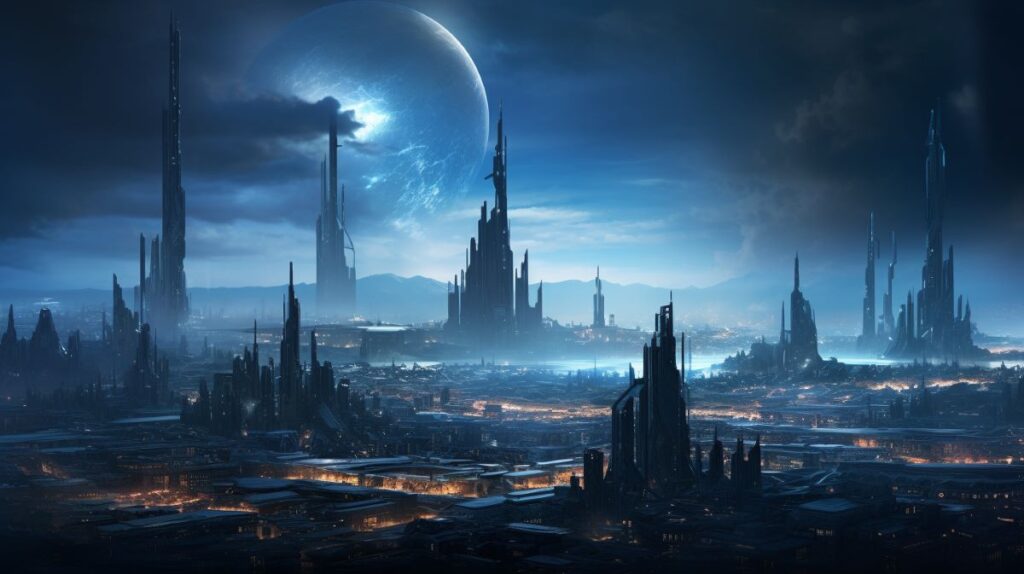
In the realm of entertainment, dark and gritty sci-fi has emerged as an unstoppable force. Audiences have been consistently drawn to tales that delve into the complexities of the future, mired in moral ambiguities and challenges. Warhammer 40,000 provides a universe that not only resonates with this trend but stands as one of its grandest examples.
Let’s explore why this grimdark setting is tailor-made for today’s cinematic palette.
The age of gritty narratives
- Modern Sci-Fi’s Shift: Shows like The Expanse and movies like Blade Runner 2049 have redefined audience expectations. Instead of the utopian futures of yesteryears, viewers are now captivated by narratives that reflect societal challenges, moral dilemmas, and the grey areas of existence.
- Perfect Timing for 40K: With its tagline “In the grim darkness of the far future, there is only war,” Warhammer 40,000 is a lore built on these very principles. It offers not a glimmer of hope, but a universe plunged in perpetual conflict, political intrigue, and profound moral complexities.
The deeply layered universe of 40k
- Endless Conflicts: From the galaxy-spanning Horus Heresy to the never-ending battle against the forces of Chaos, the universe is rife with large-scale wars, covert skirmishes, and inter-species conflicts. Each battle isn’t just about good vs. evil; it’s layered with political undertones, betrayals, and moral sacrifices.
- Moral Ambiguities Abound: The Inquisition’s brutal methods to maintain the faith, the ethical implications of the Emperor’s eternal life support, or the tragic tales of beings like the Eldar – 40K delves deep into characters and factions that aren’t simply black or white.
The appeal for filmmakers
- Diverse Story Arcs: Directors and screenwriters can dive into a multitude of narratives. They could opt for an epic like the Siege of Terra, explore covert operations with the Ravenor series, or navigate the political and spiritual intricacies of the Eisenhorn saga.
- Visual and Thematic Depth: Cinematographers and set designers would have a field day with Warhammer 40,000. From the grandeur of the Imperium’s Gothic architecture to the desolate landscapes of war-ravaged planets, there’s a wealth of imagery waiting to be captured on screen.
As dark and gritty narratives dominate the cinematic and TV landscapes, Warhammer 40,000 stands as a treasure trove of content that fits this mold seamlessly. Its intricate tales, morally complex characters, and profound themes are exactly what modern audiences crave.
For filmmakers, the universe beckons with an unparalleled depth, waiting to be transformed into the next blockbuster sci-fi franchise.
It offers the ideal canvas for epic battles and visual spectacle
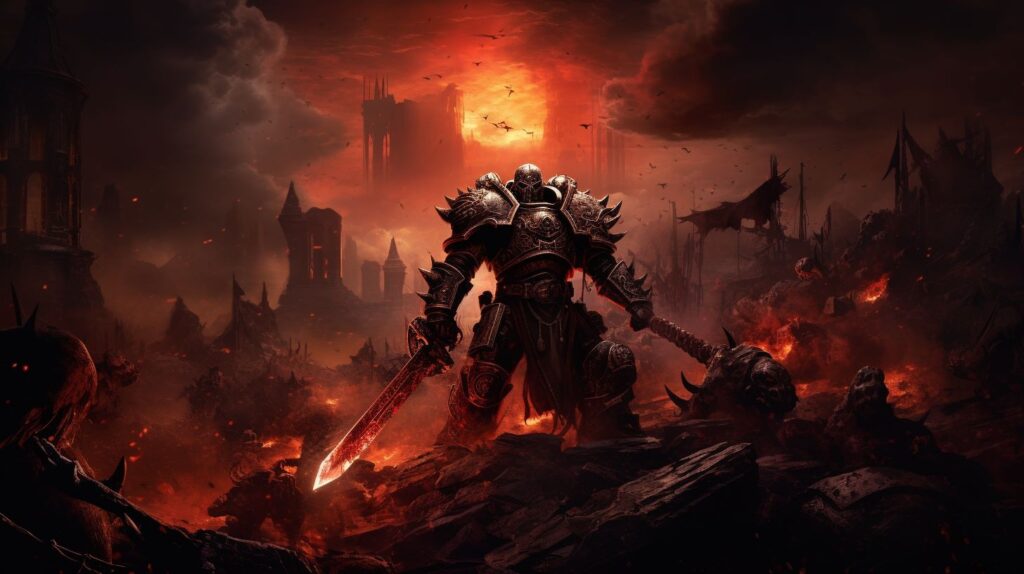
Cinema has always been a medium of visual wonder, transporting audiences to places and events beyond their wildest dreams.
Over the decades, one thing remains consistent: people love to witness epic battles and grand spectacles on the big screen. Now, imagine a universe teeming with such moments, where every tale offers breathtaking visuals and adrenaline-pumping confrontations.
Well, Warhammer 40,000 is the place where the phrase “epic scale” takes on a whole new dimension.
The grandeur of 40k’s conflicts
- Epic Proportions: The battles within the Warhammer 40,000 universe are not mere skirmishes; they’re grand confrontations. Whether it’s the cataclysmic events of the Horus Heresy, the valiant stand of the Blood Angels on Baal, or the relentless Tyranid Hive Fleets consuming entire planets, each battle is an event in itself.
- Diverse Combatants: The universe boasts an array of unique factions, each bringing their distinctive flair to the battlefield. The mechanized might of the Adeptus Mechanicus, the warp-fueled rage of Chaos Daemons, or the sleek, deadly precision of the Eldar – filmmakers have a vast ensemble at their disposal.
A visual feast awaiting cinematic translation
- Landscapes of War: The universe offers myriad terrains for combat. From the crimson sands of Mars, the fortress-monasteries like The Rock of the Dark Angels, to hive cities that span entire continents – the settings are as varied as they are awe-inspiring.
- Weapons and War Machines: The technology in 40K is both ancient and advanced. Thunderhawk Gunships roaring across skies, the behemoth that is the Imperial Titan, or the arcane weaponry of the Necrons – there’s a trove of marvels ready to dazzle on screen.
Film’s potential to elevate 40k’s battles
- Modern Film Techniques: With advancements in CGI, motion capture, and practical effects, recreating the epic scale of 40K’s battles is not just possible; it’s primed for excellence. Films like Lord of the Rings and Avengers: Endgame have showcased the potential of cinema to handle massive confrontations, and 40K offers even more.
- Soundscapes of War: Cinema is not just a visual medium. With the right score and sound design, the roar of chainswords, the ominous hum of psykers tapping into the warp, or the ethereal chants of the Adepta Sororitas can be brought to life, immersing audiences deeper into the universe.
Warhammer 40,000 is not just a series of stories; it’s a visual and auditory spectacle waiting to be unleashed. In an era where audiences crave grandeur and scale, 40K stands ready to deliver, promising cinematic moments that can rival, if not surpass, the greatest battle sequences ever put to film.
For filmmakers and audiences alike, the universe beckons with unparalleled promise. It’s more than a potential blockbuster; it’s an experience waiting to be lived on the big screen.
Its huge pool of interesting characters provide a tapestry of complexity and intrigue
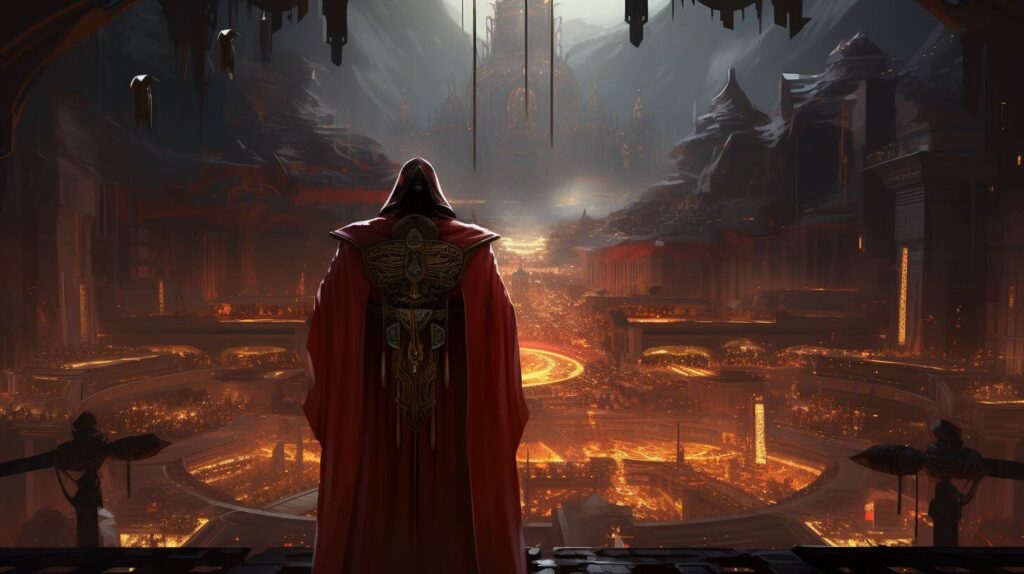
When delving into any narrative universe, captivating characters remain at the heart of an audience’s engagement. Whether they’re protagonists who capture our hearts, antagonists who fuel our fears, or the gray characters who intrigue us with their moral dilemmas, it’s these personalities that often drive the plot and anchor viewers’ investment.
In this regard, Warhammer 40,000 is nothing short of a goldmine. This universe boasts some of the most intricately designed, multifaceted, and memorable characters in sci-fi lore, all set against the grim backdrop of the 41st millennium.
A pantheon of unforgettable icons
- Legends of the Imperium: Consider characters like Roboute Guilliman, the primarch of the Ultramarines, a warrior-statesman torn between the duties of the past and the grim present. Or Inquisitor Gregor Eisenhorn, who navigates the treacherous waters of heresy and orthodoxy, often questioning where the line truly lies. Their arcs are ripe for cinematic exploration, offering depth, action, and philosophical engagement.
- Voices of Chaos: Figures like Abaddon the Despoiler, not merely an antagonist, but a tragic figure, once a paragon of virtue turned to the forces of Chaos. His narrative isn’t one of mere villainy, but of disillusionment, ambition, and the human(oid) condition.
The allure for filmmakers
- Dynamic Arcs: Unlike many black-and-white characters, 40K’s icons evolve, transform, and often find themselves at personal crossroads. For writers and directors, these dynamic arcs offer a wealth of narrative possibilities. The tragic fall of Horus Lupercal, the beloved Warmaster, is an epic waiting to be explored, filled with ambition, betrayal, and cosmic-scale drama.
- Visual Distinctiveness: In a medium where the visual element is crucial, Warhammer 40,000’s characters stand out. The ethereal elegance of the Eldar Farseers, the biomechanical horror of the Tyranid Hive Tyrants, or the regal, Gothic aesthetic of the Space Marine Chapters – each character is not just a personality, but a visual statement.
Characters as windows to the 40k universe
- Diverse Perspectives: Through characters like Ciaphas Cain, the “hero of the Imperium” (much to his own reluctant chagrin), viewers can explore the universe with humor and wit. Through the eyes of Ahzek Ahriman, the exiled Thousand Sons sorcerer, they can traverse the arcane mysteries of the warp.
- Relatability Amidst the Grandeur: At its core, the best characters resonate because they echo universal sentiments. The ambition of Fulgrim, the stoicism of Leman Russ, or the quest for redemption in Konrad Curze – these narratives strike chords because, despite their cosmic scale, they resonate with very human emotions and challenges.
Warhammer 40,000’s universe is vast, but it’s the characters that make it intimate, tangible, and incredibly compelling. For filmmakers, this galaxy is populated with figures that can drive blockbusters, inspire cult classics, and etch unforgettable tales into cinematic history. Dive into this world, and you won’t just find stories; you’ll discover legends waiting to be told.
It provides an infinite canvas for spin-offs and expanded Universes
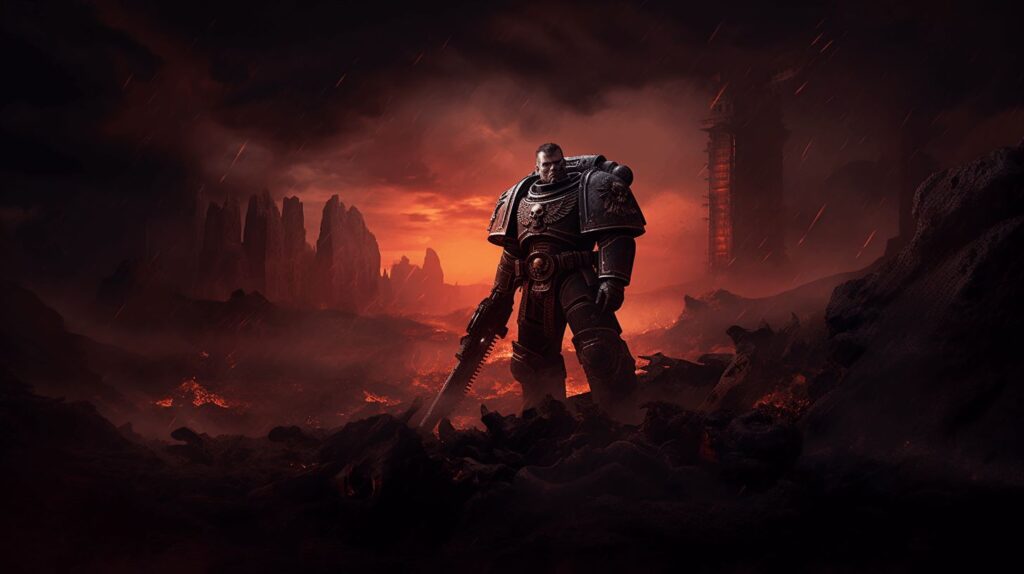
When thinking about vast universes that have been masterfully unfolded on the big screen, a few giants come to mind: Star Wars, Marvel, Harry Potter, and even The Fast and the Furious.
These franchises haven’t merely treated viewers to primary narratives; they’ve spread their wings, offering spin-offs, prequels, sequels, and intertwined tales. Amidst these giants, the Warhammer 40,000 universe emerges as an uncharted frontier, teeming with endless potential for filmmakers.
Drawing inspiration from cinematic titans
- Vast and Diverse Factions: Star Wars went beyond the Skywalker journey, gifting audiences with stories like Solo—a dive into the history of the galaxy’s most beloved rogue. Similarly, 40K’s plethora of factions—from the Orks to the grimdark Imperial Guard regiments—can each serve as foundations for unique tales.
- Worlds Waiting to be Explored: Just as Harry Potter introduced us to magical corners outside Hogwarts with Fantastic Beasts, Warhammer 40,000 boasts planets like Fenris, home to the Space Wolves, or the sprawling hive cities teeming with intrigue and danger.
The beauty of anthologies and character deep dives
- Anthological Epics: In the manner of Star Wars: The Clone Wars, which widened the scope of the galaxy far, far away, Warhammer 40,000 can spotlight unique tales from the Horus Heresy, Black Crusades, or the events of the Cicatrix Maledictum in episodic wonders.
- Character-Centric Stories: Much like how The Fast and the Furious presented Hobbs & Shaw, a buddy cop-style spin-off, 40K’s vast character roster can lead their standalone ventures. Dive into the enigmatic ventures of the C’tan Shard or follow the Adeptus Mechanicus‘ quest for arcane tech-relics.
Genre diversity: the cinematic spectrum
- Genre Fluidity: From heist stories inspired by Ant-Man in the Marvel universe to sprawling epics reminiscent of Avengers: Endgame, the 40K universe can fluidly move from horror tales of the Tyranid invasions to space opera epics centered on the Astral Knights.
- Extended Universe Opportunities: As The Witcher series branched out with The Witcher: Nightmare of the Wolf, an animated spin-off, Warhammer 40,000 offers rich content for movies, series, animations, and even docudramas, exploring its rich history and lore.
If the entertainment industry’s giants have shown us anything, it’s that a universe’s potential is limited only by imagination. Star Wars, Marvel, Harry Potter, and more have charted the course. For Warhammer 40,000, the galaxy is the starting point. Filmmakers have an opportunity not just to adapt but to innovate, create, and expand.
Its an uncharted territory of unique storytelling
Storytelling is the heart of cinema. Throughout film history, audiences have been captivated by conventional tales, only to be then enamored by the unconventional, the new, the avant-garde.
As filmmakers hunt for fresh narrative styles, the Warhammer 40,000 universe stands out as a treasure trove of unique storytelling opportunities, much like the mind-bending tales of Christopher Nolan or the ethereal journeys crafted by Guillermo del Toro.
Narrative depth beyond battlefields
- Philosophical Undertones: The 40K universe isn’t merely about grand battles; it tackles deep philosophical questions about humanity, belief, and sacrifice. Just as Blade Runner probed what it means to be human, the struggles of the Emperor, the psyche of the Astartes, or the dual existence of the Eldar can challenge audience perceptions.
- Non-linear Story Arcs: The likes of Memento and Inception have shown audiences’ appetites for non-linear stories. Within the 40K world, the warp and its unpredictable nature, the intertwining fates of primarchs, and the cyclic rituals of the Necrons offer fantastic frameworks for multi-dimensional, time-warped tales.
Diverse themes & genres within a galaxy
- Horror & Mystery: The universes of movies like Pan’s Labyrinth or The Shape of Water merge the eerie with the beautiful. The Warhammer 40,000 universe is filled with such potential—from the cryptic Dark Eldar to the otherworldly horrors of the Chaos Gods.
- Drama & Intrigue: Beyond the action-packed frontlines lie tales of political intrigue, betrayal, and subterfuge, reminiscent of classics like The Godfather or the nuanced relationships of Atonement. The inner workings of the Imperium, the convoluted politics of the Tau, or the complex brotherhoods of the Space Marines offer deep wells of character-driven plots.
A chance to innovate cinematic storytelling
- Symbolism & Allegory: The Warhammer 40,000 universe is ripe with symbols, from the dual-faced Aquila representing the Imperium’s vastness to the myriad icons of Chaos. Like the allegorical elements in Parasite or Mother!, filmmakers can play with these symbols to craft multi-layered narratives.
- Experimental Cinematography: Just as Birdman presented an entire story in what seemed like a single take, the sprawling landscapes, vast battles, and psychedelic realms of the warp in 40K offer cinematographers the canvas to innovate, experiment, and redefine visual storytelling.
Warhammer 40,000 is not just another sci-fi universe—it’s an unexplored realm of stories that challenge conventions, invite introspection, and redefine narrative boundaries. In a world hungry for fresh cinematic experiences, this galaxy promises tales that can both entertain and elevate. It’s a storytelling goldmine, beckoning filmmakers to dive deep and unearth its riches.
W40K offers a treasure trove of cinematic revenue potential
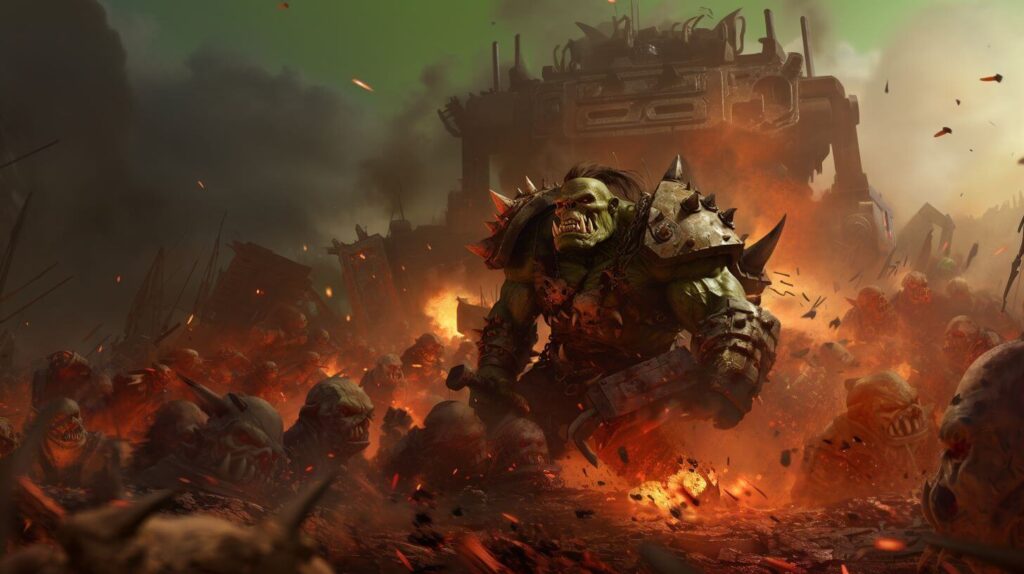
In the world of film and television, investment isn’t just about capital—it’s about foreseeing potential. As franchises like Marvel, Star Wars, and Jurassic Park have shown, the right universe can generate not just ticket sales, but a cultural phenomenon. Warhammer 40,000, with its deep roots and expansive world, stands on the brink of becoming cinema’s next financial juggernaut.
The proven track record of expansive universes
- Consistent Blockbusters: Just as the Marvel Cinematic Universe churned out consistent box office successes from Iron Man to Avengers: Endgame, the stories within the Warhammer 40,000 universe—each with its legion of fans—promise a steady stream of high-grossing releases. Each faction, from the Space Marines to the Orks, carries a potential blockbuster tale.
- Merchandising Potential: The power of merchandising can’t be understated. Think of the Baby Yoda phenomenon following The Mandalorian. The vast range of characters, armies, and vehicles in 40K present countless opportunities for toys, apparel, and collectibles.
Franchise opportunities beyond mainline releases
- Sequels, Prequels, and Spin-offs: The stories in Warhammer 40,000 aren’t linear—they’re a web of interconnected tales spanning millennia. This structure offers endless possibilities for sequels, prequels, and spin-offs, much like the Star Wars universe expanding beyond the Skywalker saga.
- Subscription Services & Exclusive Content: The success of platforms like Disney+ with exclusive content such as WandaVision and The Falcon and the Winter Soldier suggests a future where Warhammer 40,000 series or specials could anchor a streaming service, driving subscriptions and consistent revenue.
Tapping into global markets
- International Appeal: The Warhammer 40,000 game has fans worldwide, ensuring a global audience from the get-go. With smart localization and culturally resonant stories—akin to how Marvel introduced characters like Shang-Chi—the franchise can deeply penetrate international markets.
- Interactive Media & Tie-ins: The transition from screen to interactive platforms is more fluid than ever. Just as The Witcher series boosted interest in the video game, a successful Warhammer 40,000 movie or series can revitalize interest in the tabletop game, video games, and novels, creating a symbiotic relationship of financial success across media.
Warhammer 40,000 isn’t merely a game or a series of novels—it’s a universe brimming with untapped financial potential.
With the right vision, investment, and commitment, this universe can not only match the cinematic giants of our age but possibly even surpass them. The figures don’t lie: the galaxy’s the limit for Warhammer 40,000’s cinematic voyage.
Our Final Take:
To say Warhammer 40,000 is merely a potential movie franchise is to look at a Space Marine and call him “just a soldier”. With epic stories, a fervent fanbase, and a universe just waiting to be unveiled on the silver screen, Warhammer 40,000 doesn’t ask if it can be the next big thing—it demands it. The cinematic cosmos is about to get a whole lot more intriguing!

